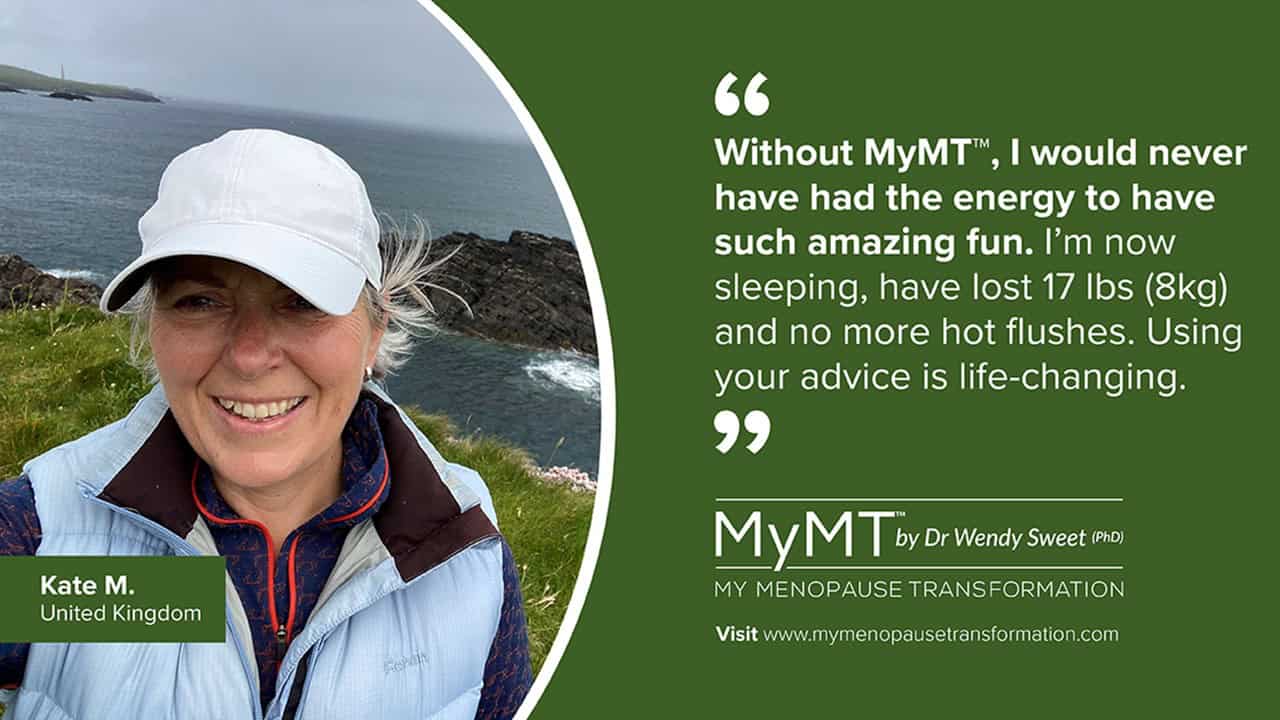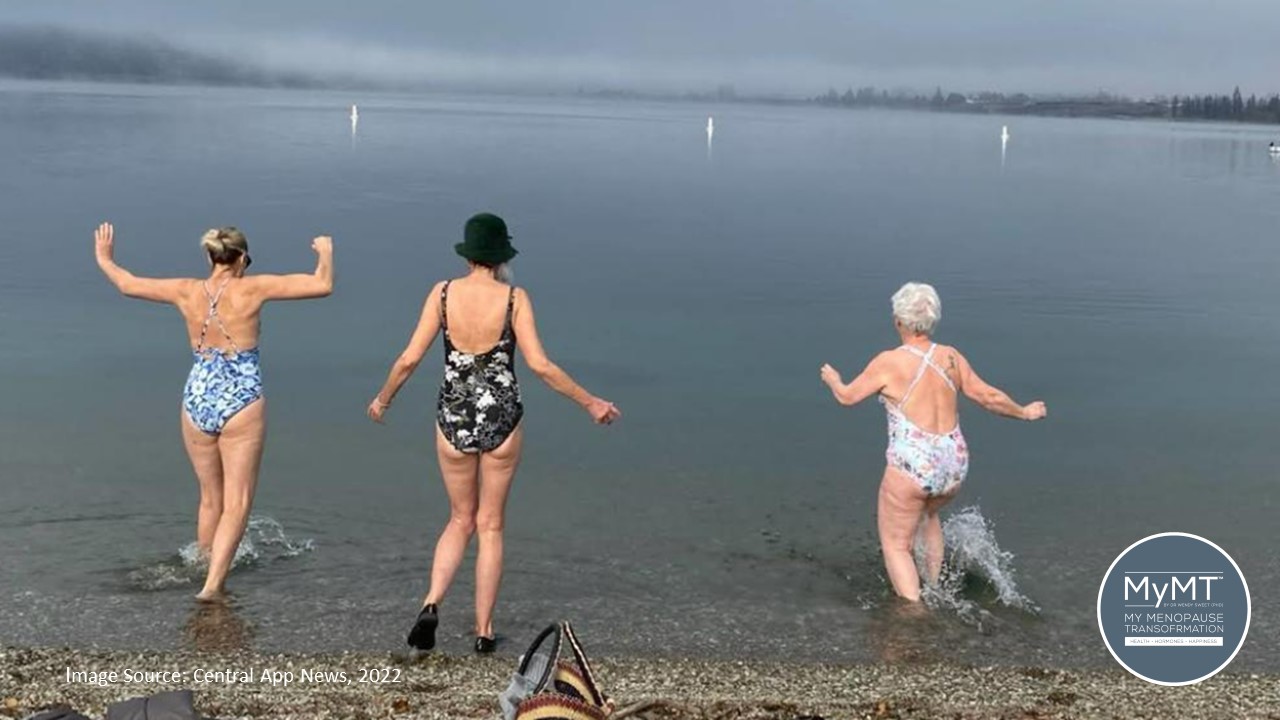Over the past few days, in a small New Zealand South Island town, swimmers have been brvely swimming length after length in an outdoor pool. If you think that this is not an unusual phenomenon, then let me explain … the water temperature in the pool has met the International Ice Swimming Association (IISA) regulation of being 5°C or lower. It’s New Zealand’s very first ‘ice-swim’.
How brave are those swimmers?! With ages ranging from 16 years to 66 years, I know one of them. She is in her 50s and a very experienced long-distance swimmer. As I saw her rush into the changing-rooms from my very warm perch on the couch in front of the television news, I thought to myself, “I would love to know what her core temperature and blood pressure are right now and I bet, she isn’t experiencing any hot flushes.”
Cold water swimming has emerged as an activity of interest for athletes and the general population and has a long tradition in Northern Hemisphere countries. Whilst there are obvious risks for people who are not acclimatised to the cold-water immersion, studies have shown that for midlife and older women, there may well be benefits to blood pressure and weight management.
Are you a swimmer? If so, then when did you last go for a swim? I’m not just talking about a dip in the hot-pools, or jumping waves at the beach – I’m talking about swimming for at least 30 minutes. Overarm, breast-stroke, backstroke or butterfly – it really doesn’t matter which stroke you do.
What matters is that if you’re in post-menopause, that you ‘do it’. There’s a reason I’m saying this and it’s to do with the benefits of swimming in helping to manage your blood pressure, liver health and lymphatic health as you move into post-menopause.
Swimming is a rhythmic, dynamic form of endurance exercise which involves large muscle groups. As I discovered myself, when my joints were sore and no amount of exercise was shifting the weight accumulating under my diaphragm, swimming offered a great alternative to land-based exercises which left me sore and my muscles tight.
It also offered me a way to stretch out my diaphragm and improve my lymphatic system – which helps to remove toxins from fat cells. So, whether you are a competent swimmer or not, if you are in menopause or post-menopause, then add it to your exercise routine if (and when) you can.
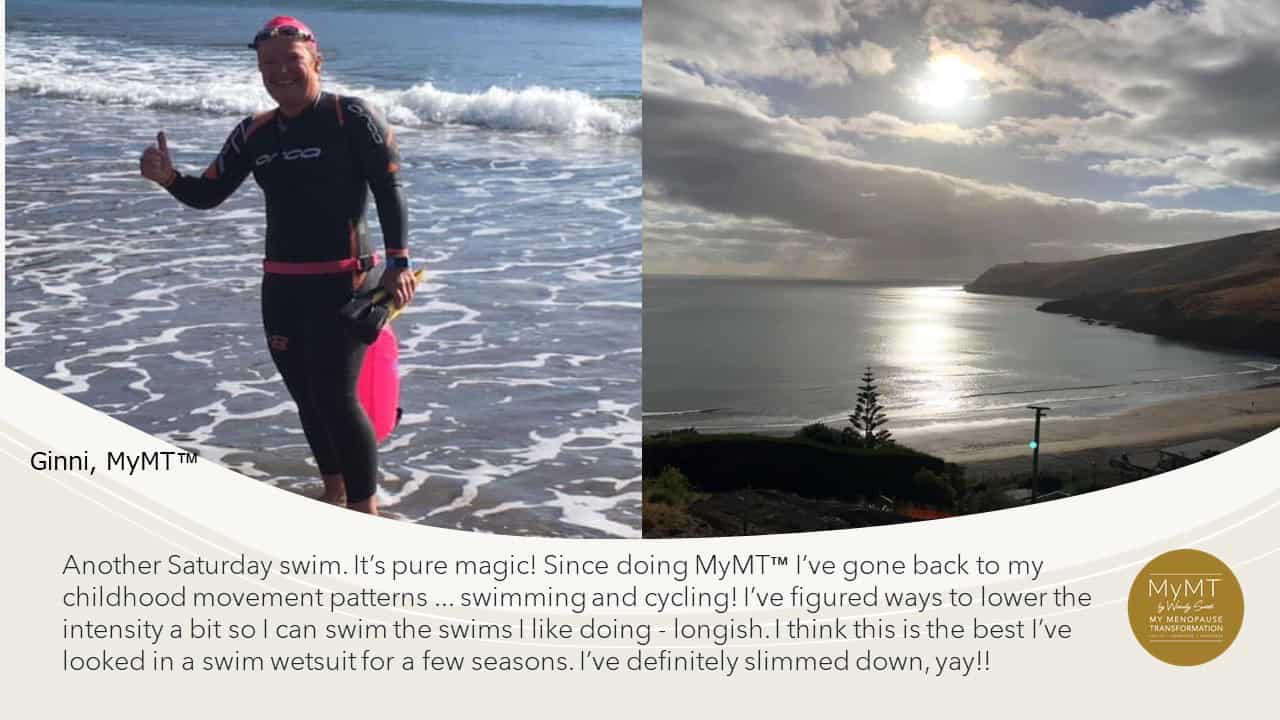
For years, swimming has been thrown into the mix with other forms of exercise. Exercise recommendations regarding swimming for health have generally been generated from research on other modes of exercise such as walking or cycling – after-all, they fall into the category of ‘aerobic exercise’ that are recommended for prevention of heart disease. However, the problem with swimming is that it hasn’t really been researched independently of the other aerobic exercise modalities.
Which is why I like human studies that explore swimming on its own. It’s low-impact, low-cost and in most countries, reasonably accessible. And yes, whilst it does require some co-ordination and skill in order to achieve an intensity that improves cardiac health, even if you aren’t a good swimmer, there are other benefits, including helping to improve joint health and mobility.
If you have a frozen shoulder or your knees and ankles are stiff, then get in the pool if you can. Compressive forces on muscles and joints are lower when we swim compared with running and cycling.
The real benefits from swimming when we are in menopause and post-menopause are not only to do with our muscles and joints however, but all to do with our blood pressure and lymphatic system.
High blood pressure (hypertension) poses a major health risk to women as they age. To date, most studies have focused on cycling and walking and less on swimming. So, the news that regular swimming confers cardiac health benefits, including an increase in ‘good’ HDL cholesterol in post-menopause women is important (Tanaka, 2009).
Swimming decreases the vascular stiffness that arrives as we lose oestrogen in menopause. I’ve talked about this in numerous blogs, but this is one of the first studies that confirms the benefits of swimming to our cardio-vascular system as we age.
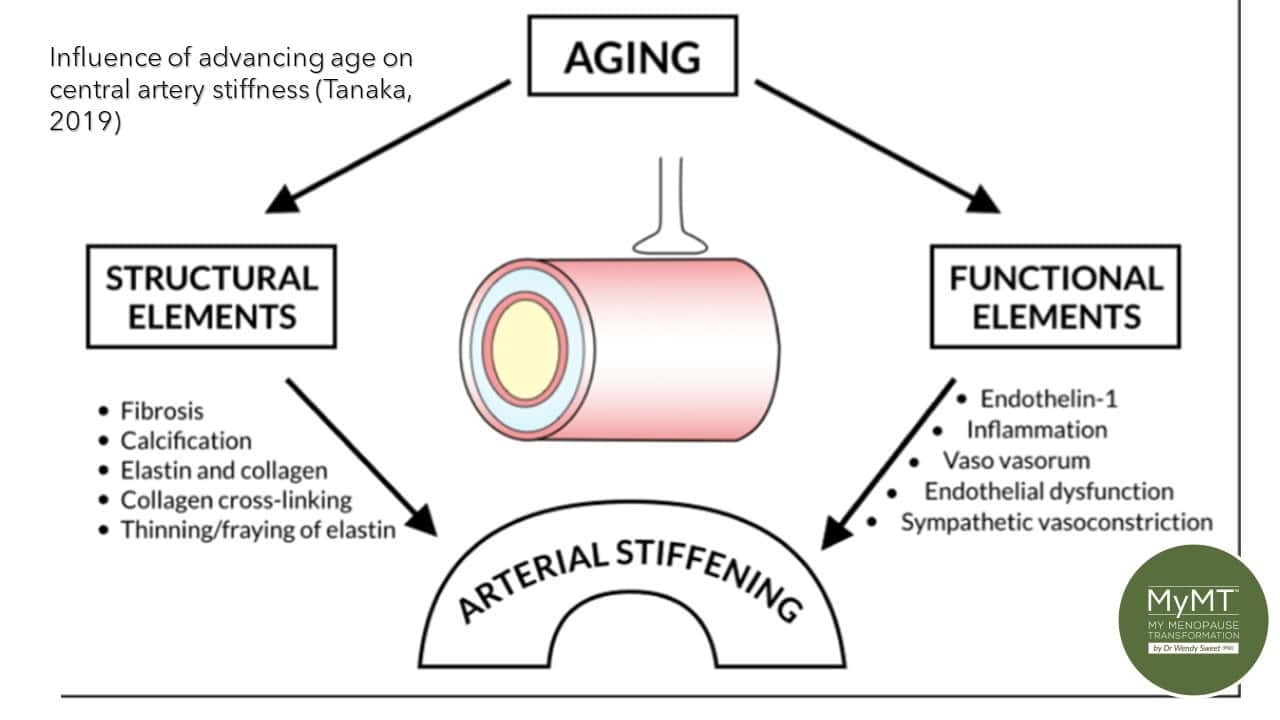
Even better, if you can swim in cooler water, then go for it. The health benefits of cold-water immersion is gaining greater interest in Sport and Exercise Science relative to women in menopause. It seems that goose-bumps are now a good thing. Especially for weight management as we age.
As women in menopause, it pays to be cold for some parts of our day – and I don’t mean hypothermia (the dangerous drop in core temperature that can leave you unconscious), but I do mean trying to lower your temperature to beat the heat and activate what researchers understand as ‘brown fat thermo-genesis’.
They found that exercising outside in the cold and lowering our temperature by only 1-2 degrees, stimulates the growth of healthy brown fat. This type of fat is metabolically active because it is rich in mitochondria.
You’ve heard me talk about these wonderful organelles before – your mitochondria are the ‘energy powerhouse of your cell’ where oxygen and fats and glucose are taken to turn into energy. The more mitochondria we have, the more energy we have and the more fat we ‘burn’. If our mitochondria aren’t functioning very well, then we don’t function very well either. We feel tired, sore and un-healthy.
Longevity researchers also know that our mitochondrial health is important for our improved health as we age and I talk a lot about this in my 12 week programmes and in my online Masterclass on Menopause too.
The amount of mitochondria-rich brown fat decreases with age and as we move through menopause it mingles with white fat and spreads out around our abdomen as well as our heart. And don’t worry, the only way to determine your ratio of brown fat to white fat is to have this measured by a physiologist or have an MRI or similar, so you may never know what your ratio’s are.
But what we need to do is try to activate brown fat to help manage our weight in post-menopause. Researchers from a Quebec University now better understand that we can stimulate more brown fat mitochondria by being out in the cold and exercising in the cold as well.
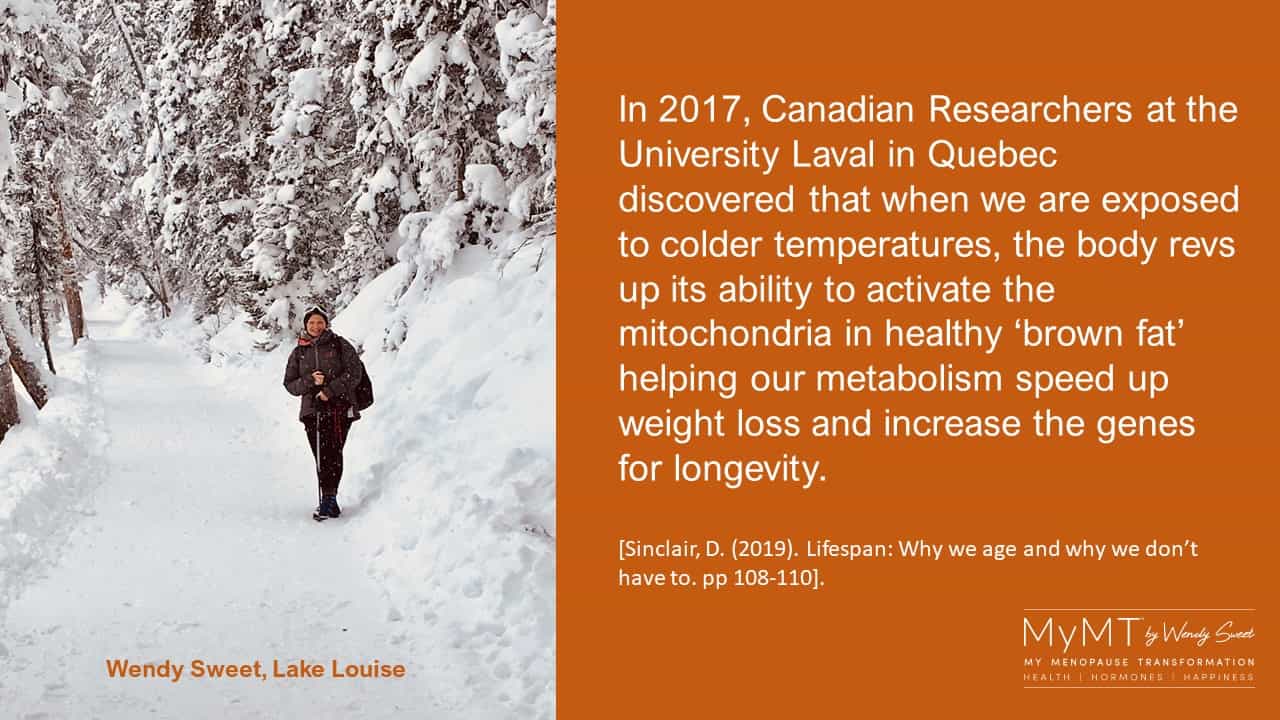
When we start to shiver when we are cold, our metabolic rate is increased due to the shivering which is the body’s attempt to produce heat. As such, higher oxygen consumption is required. Because of this, heart rate is increased making the heart work faster to provide the body with oxygen.
This results in not only stimulating healthy brown fat production, but increases our metabolic rate during rest afterwards. This is important for weight loss, because as we move through menopause, we lose muscle density, so our metabolism naturally declines with age.
If you have a sedentary job and you can’t exercise because you feel exhausted and have sore joints, then your metabolism can down-shift faster too. That’s why swimming is good for you [Theodorou & Kabir, 2019], and of course knowing what to do to turn around your sore joints, become more active and feel healthy and energetic again is the purpose of the MyMT™ programmes.
It’s also why I have a bonus module for you in my Transform Me post-menopause programme, which I’ve called ‘Restore your Joyful Joints’. I mention swimming in this too.
Dr Wendy Sweet, [PhD], MyMT™ Founder/ Member: Australasian Society of Lifestyle Medicine.
References:
Honda T, Kamioka H. Curative and health enhancement effects of aquatic exercise: evidence based on interventional studies. (2012). Open Access J Sports Med. 29;3:27-34. doi: 10.2147/OAJSM.S30429.
Knechtle B, Waśkiewicz Z, Sousa CV, Hill L, Nikolaidis PT. (2020). Cold Water Swimming-Benefits and Risks: A Narrative Review. Int J Environ Res Public Health. 2;17(23):8984. doi: 10.3390/ijerph17238984.
Nualnim N., Parkhurst, K. et al. (2012). Effects of Swimming Training on Blood Pressure and Vascular Function in Adults >50 Years of Age. Am J Cardiol. 109: 1005–1010
Tanaka H. (2009). Swimming exercise: impact of aquatic exercise on cardiovascular health. Sports Med., 39(5):377-87. doi: 10.2165/00007256-200939050-00004. PMID: 19402742.
Theodorou, M. & Kabir, R. (2019). Exploring the effects of cold-water swimming on an obese population: A systematic review. Journal of Applied Sports Sciences, Vol. 2, pp. 3-21
Related Tag: Losing Weight Menopause
